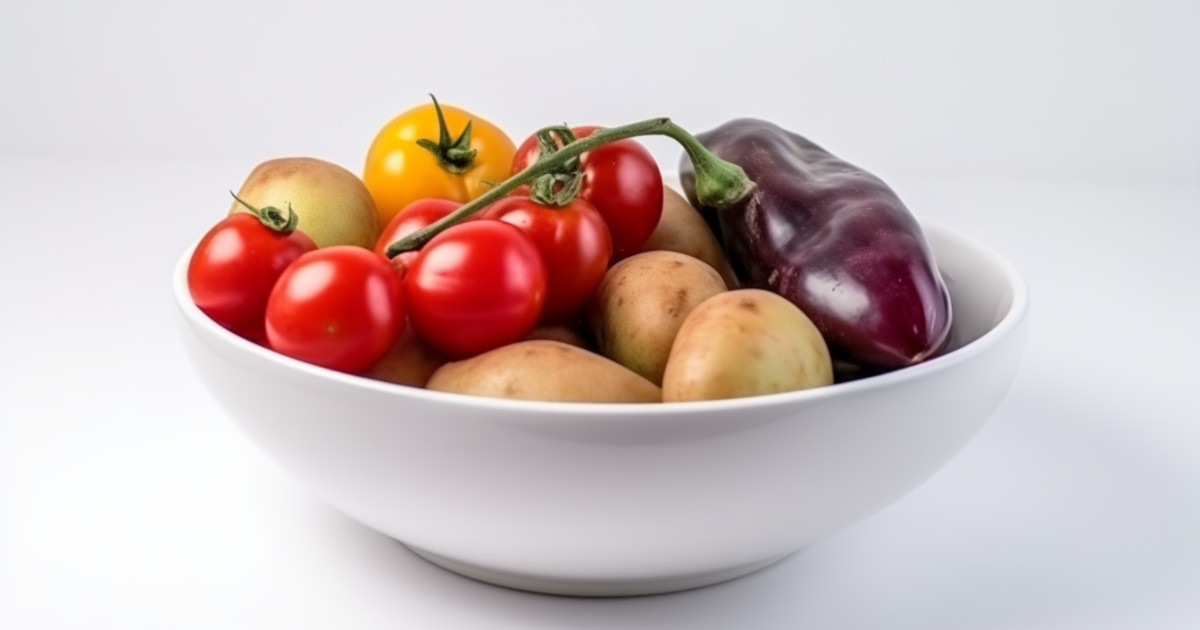There is some truth to the idea that there is no specific list of foods that should be avoided for back pain, as everyone’s diet and pain tolerance are different. That being said, however, there are the usual suspects we need to keep in mind when looking at foods to avoid for back pain. These may include:
- Sugary Foods
- Dairy Products
- Processed Meats
- Saturated Fats
- Some Grains
- Nightshades
Let’s consider these a little closer…
Table of Contents
What is the Connection Between Foods and Back Pain?
I want you to keep in mind that unless you have some specific reaction to a food that triggers instantaneous back pain, it is usually the result of a habit of consumption over a given time frame that results in the symptoms appearing.
I can’t think of anything noted in my human experience that triggered back pain the moment I ate it. Nor can I say that I have ever had anyone recount such a situation to me.
Much like eating a greasy burger with large fries and a jumbo soda won’t instantly put 15kg on your waist, these things happen over time based on habits.
The literal connection in this topic between the food and the back pain seems disingenuous on the surface. It’s more to do with indirect causality in my opinion. 1
6 Foods To Avoid For Back Pain
Therefore, the foods to avoid for back pain are the ones that will take you down a progressive path to weight accumulation, physical stress, aggravating inflammation in the body, and generally contributing to an unwell state.
Many of the foods that fit this bill include the following and should be considered as something to only have in moderation, if at all.
Sugary Foods
The immediate association between sugary foods and health is that they will rot your teeth, or make you fat.
However, there is some evidence to suggest that consuming a diet high in added sugars may be associated with an increased risk of inflammation in the body. 2
Inflammation is a normal immune response that occurs in the body in response to tissue injury or infection, and it involves the activation of immune cells and the release of pro-inflammatory chemicals, such as cytokines and prostaglandins, which help to coordinate the immune response and promote healing.

One possible mechanism by which a diet high in added sugars may contribute to inflammation is through its effect on blood sugar levels. When you consume a food or drink that is high in added sugars, your blood sugar levels can rise rapidly.
This can lead to the release of insulin, a hormone that helps to regulate blood sugar levels. If blood sugar levels rise too high or too frequently, this can lead to insulin resistance, a condition in which the body becomes less sensitive to insulin.
Insulin resistance has been linked to an increased risk of inflammation and the development of chronic conditions such as diabetes and heart disease. 3
However, it’s important to note that the relationship between a diet high in added sugars and inflammation is not well established, and more research is needed to fully understand the mechanisms underlying this association.
Dairy Products
Similar to sugar, dairy may be another of the foods to avoid for back pain which you need to consider carefully. Too much dairy can result in any number of weight-related health issues.
One possible mechanism by which dairy products may contribute to back pain could be through inflammation is suggested in certain studies that it is through the proteins they contain. Although, these are unclear and more research is needed. 4
Dairy products contain proteins such as casein and whey, which can stimulate the production of pro-inflammatory cytokines in some individuals. 5
Some studies have suggested that consuming large amounts of these proteins may be associated with an increased risk of inflammation and the development of chronic conditions such as heart disease and diabetes.
Processed Meats
Processed meats can easily join the sugary foods and dairy products gang in that they should only be consumed in moderation, if at all. Too much-processed meat in your diet can lead to unhealthy weight gain. But that’s not all that needs to be considered.
As processed meats are meats that have been preserved through methods such as curing, smoking, or the addition of preservatives, the processes and additives are where many of the complications tend to arise concerning inflammation.
Some people claim that consuming processed meats can cause joints to feel painful, but there is limited scientific evidence to support this claim. One possible explanation for this belief is that processed meats may contain chemicals and additives that have been associated with inflammation in the body.

For example, processed meats may contain high levels of sodium, which can increase blood pressure and contribute to inflammation. 6
Additionally, some processed meats may contain additives such as nitrates and nitrites, which have been suggested to have pro-inflammatory effects.
It’s also worth noting that consuming large amounts of any type of meat may contribute to inflammation in the body. This is because meat is high in saturated fat, which has been linked to inflammation when consumed in large amounts.
Possibly another consideration to make in the foods to avoid for the back pain category?
Saturated Fats
Saturated fats are a type of fat that can contribute to weight gain if consumed in excess. Like all fats, they are high in calories, with 9 calories per gram. 7
If you eat more calories than your body needs, the excess calories can be stored as fat, leading to weight gain. The flip side of this is a calorie deficit, which, when done in a controlled and healthy way, supports weight loss.
Saturated fats are found in foods such as red meat, poultry with skin, full-fat dairy products, and tropical oils like coconut and palm oil. These foods can be part of a healthy diet in moderation, but it’s important to be mindful of portion sizes and to balance them with other types of fats and nutrients.
In addition to their high-calorie content, saturated fats may also contribute to weight gain in other ways. Some studies have suggested that saturated fats may increase appetite and lead to overeating, and they may also interfere with the body’s ability to burn fat.
Research also suggests that a diet high in saturated fats may increase inflammation in the body. 8
These foods can raise levels of low-density lipoprotein (LDL) cholesterol, also known as “bad” cholesterol, in the blood.
Also, high levels of LDL cholesterol are associated with an increased risk of heart disease, as LDL cholesterol can build up in the arteries and form plaque, which can block or narrow the arteries.
It’s important to note that not all fats are created equal, and not all fats contribute to weight gain. Some types of fats, such as unsaturated fats, can be beneficial for weight management and overall health.
Some Grains
When it comes to grains, it seems that the biggest factor is how some people react when consuming them. Take for example someone who lives with coeliac disease.
People with coeliac disease experience an immune reaction to the protein gluten, which is found in certain grains, such as wheat, barley, and rye. When someone with coeliac disease consumes gluten, the immune system attacks the small intestine, causing inflammation and damage to the lining of the intestine. 9
This immune reaction to gluten can cause a range of symptoms, including digestive issues, abdominal pain, bloating, and diarrhea. Coeliac disease can also cause other health problems, such as malnutrition, anemia, and osteoporosis if it is not properly managed.
With this in mind, although not directly connected, one type of grain that has been linked to inflammation, and potentially connected to foods to avoid back pain is refined grains. 10
Refined grains are grains that have had their bran and germ removed, leaving only the endosperm. This process removes some of the nutrients and fibre from the grain. Refined grains typically include white rice and white flour. These grains are often found in processed foods, such as bread, pasta, and baked goods.
Some studies have suggested that a diet high in refined grains may increase inflammation in the body, potentially increasing the risk of chronic diseases such as heart disease and diabetes.
On the other hand, whole grains, which contain bran, germ, and endosperm, may have an anti-inflammatory effect and may be beneficial for overall health. Whole grains include oats, quinoa, buckwheat, millet, whole wheat, varieties of wild rice, and brown rice.
It’s important to note that not all grains are inflammatory, and many grains can be part of a healthy diet. It’s generally recommended to include a variety of whole grains in your diet, as they provide important nutrients and can be part of a balanced diet.
It’s also important to pay attention to portion sizes and to balance your intake of grains with other types of nutrients.
Nightshades
It isn’t always so much about what you eat as it is about what is in the things you are eating. For example, a Mediterranean vegetable stack cooked without any oil, salts or sugars might sound like one of the healthiest options going.
But what if you find that the veggies used in this dish are a trigger for inflammation in different parts of your body? Some vegetables, like nightshades, can wreak havoc on some people’s bodies.
Alkaloids are naturally occurring compounds found in a variety of plants, including nightshades, and they have some physiological effects on the body. Some studies have suggested that alkaloids found in nightshades may have pro-inflammatory effects, but more research is needed to confirm this. 11
It’s also worth noting that many of the foods that are commonly considered to be “anti-inflammatory” are also nightshades. Some examples of nightshades include:
- Tomatoes
- Capsicums (Peppers)
- Eggplant (Aubergine)
- Potatoes
- Tobacco

While some people may be sensitive to nightshades, and experience symptoms such as digestive issues or joint pain after consuming them, it’s not clear whether this is due to the alkaloids or other compounds found in these foods triggering biological responses.
How does Weight Gain Influence Back Pain?
Carrying excess weight can contribute to the development and worsening of back pain. This is because extra weight puts added pressure on the spine and the muscles and ligaments that support it, which can lead to muscle strain and other injuries. 12
In addition to the mechanical strain on the spine, excess weight can also contribute to the development of chronic back pain through other mechanisms.
For example, excess weight can increase the risk of developing conditions such as osteoarthritis and degenerative disc disease, which are common causes of chronic back pain. Excess weight can also increase the risk of developing other conditions that are associated with back pain, such as diabetes and heart disease.
Losing excess weight can help to reduce the risk of developing back pain and may help to alleviate existing back pain. This requires consideration to be given to the foods to avoid back pain from an unhealthy weight gain potential perspective.
Losing weight can help to reduce the mechanical strain on the spine and the risk of developing other conditions that are associated with back pain.
What Foods Accelerate Weight Gain?
Many factors can contribute to weight gain, including genetics, physical activity level, and dietary habits. However, in this instance, we are exclusively considering foods to better understand the foods to avoid back pain.
Some foods and drinks may contribute to weight gain more than others due to their high calorie or fat content, or because they are low in fibre and nutrients.
Here are a few examples of foods that may contribute to weight gain:
- Foods high in added sugars
- Foods and drinks that are high in added sugars, such as sodas, sports drinks, and sweetened teas, can contribute to weight gain because they are calorie-dense and offer little to no nutritional value.
- Foods high in saturated and trans fats
- Foods that are high in saturated and trans fats, such as fried foods, processed snacks, and baked goods, can contribute to weight gain because they are high in calories and can raise levels of “bad” LDL cholesterol in the blood, which may increase the risk of heart disease.
- Foods high in refined carbohydrates
- Foods that are high in refined carbohydrates, such as white bread, pasta, and pastries, can contribute to weight gain because they are rapidly absorbed into the bloodstream and can cause a rapid increase in blood sugar, leading to feelings of hunger and cravings for more refined carbs.
- Alcohol
- Alcohol can contribute to weight gain because it is high in calories and can interfere with weight loss efforts. Alcohol can also stimulate appetite and increase cravings for unhealthy foods.
How do Stimulants Influence Back Pain?
Stimulants can influence back pain in several ways. Caffeine, for example, is a common stimulant that is found in many foods and beverages, including coffee, tea, and chocolate.
Caffeine can increase energy and alertness and has been shown to improve mood and cognitive function.
However, caffeine can also have negative effects on the body, including increasing heart rate and blood pressure, and it can interfere with sleep. Although not strictly a food per se, this made it to the list of foods to avoid for back pain as it is highly consumed by many. 13
Poor sleep quality can contribute to the development and worsening of chronic back pain, and getting enough sleep is important for overall health and well-being.
In addition to its potential effects on sleep, caffeine can also act as a diuretic, meaning that it can increase urine production and lead to dehydration.
Dehydration can cause muscles to become tense and fatigued, which can contribute to back pain. 14
What Foods Act as Stimulants?
Several foods can act as stimulants, meaning that they can increase energy, alertness, and focus. Here are a few examples:
- Caffeine
- Caffeine is a natural stimulant that is found in several foods and beverages, including coffee, tea, cocoa, and chocolate. Caffeine works by stimulating the central nervous system and increasing the production of the neurotransmitter dopamine, which helps to improve mood and alertness.
- Sugar
- Sugar can provide a quick burst of energy because it is rapidly absorbed into the bloodstream, leading to a rapid increase in blood sugar levels. However, this energy boost is often short-lived and can be followed by a crash in energy levels.
- Nuts
- Nuts, such as almonds and walnuts, are a good source of protein and healthy fats, which can provide sustained energy and help to improve focus and concentration.
- Whole grains
- Whole grains, such as whole wheat and quinoa, are high in complex carbohydrates, which are absorbed more slowly into the bloodstream than simple carbs. This can provide sustained energy and help to improve focus and concentration.
It’s important to note that while these foods can provide a boost in energy and alertness, it’s important to consume them in moderation as part of a balanced diet.
Consuming too much of any one food or nutrient can have negative health consequences.
How does Inflammation Influence Back Pain?
Inflammation can play a role in the development and worsening of back pain. Inflammation is a normal immune response that occurs in the body in response to tissue injury or infection.
It involves the activation of immune cells and the release of pro-inflammatory chemicals, such as cytokines and prostaglandins, which help to coordinate the immune response and promote healing. 15
In some cases, inflammation can cause pain and swelling in the affected area. For example, if you have a muscle strain or sprain, inflammation may occur in the affected muscles or ligaments, which can cause pain and swelling.
Inflammation can also contribute to the development of chronic back pain, which is defined as pain that persists for more than three months.
Chronic back pain is often caused by degenerative changes in the spine, such as degenerative disc disease or osteoarthritis, and these conditions are often accompanied by inflammation.
What Foods Aggravate and Cause Inflammation?
The foods to avoid degenerative disc disease are those that will cause inflammation. There is some evidence to suggest that certain foods may contribute to inflammation in the body.
Here are a few examples of foods to avoid for back pain that may aggravate or cause inflammation:
- Refined carbohydrates
- Foods like white bread, pastries, and sugary drinks are high in refined carbohydrates, which can cause a rapid increase in blood sugar and lead to inflammation. 16
- Trans fats
- These unhealthy fats, which are often found in fried foods, processed snacks, and baked goods, have been linked to inflammation in the body. 17
- Processed meats
- Meats that are preserved with chemicals, such as hot dogs and deli meats, may contribute to inflammation in the body. 18
- Excessive alcohol
- Consuming large amounts of alcohol can lead to inflammation in the body and increase the risk of developing certain health conditions. 19
- Industrial seed oils
- Oils like corn oil, soybean oil, and cottonseed oil are high in omega-6 fatty acids, which have been linked to inflammation when consumed in large amounts. 20
It’s important to note that these are just a few examples, and the relationship between specific foods and inflammation is complex and not fully understood.
The best way to support overall health and well-being is to follow a healthy, balanced diet that includes a variety of whole, nutrient-rich foods.
Tips to Avoid Food or Diet-Related Back Pain
As highlighted, some people may find that certain foods or food groups worsen their back pain, while others may find relief from incorporating certain foods into their diet.
There is no ‘once-and-done’ approach here that does not include speaking with a specialist who can give you tailored advice. You may need to work through an elimination diet over a couple of months to identify what your triggers are and to effectively work on resetting your body.
You may find that these articles are also worth reading:
Here are a few general tips for managing back pain to consider in conjunction with the foods to avoid back pain:
- Stay hydrated
- Drinking plenty of water can help keep your muscles and joints healthy and reduce inflammation.
- Eat a well-balanced diet
- A diet rich in fruits, vegetables, whole grains, and lean proteins can help reduce inflammation and promote overall health.
- Avoid processed foods
- Processed foods are often high in added sugars, salt, and unhealthy fats, which can contribute to inflammation.
- Limit alcohol and caffeine consumption
- Both alcohol and caffeine can have a dehydrating effect on the body, which can exacerbate back pain.
Consider adding anti-inflammatory foods to your diet: Some foods that may have anti-inflammatory properties include ginger, turmeric, berries, and fatty fish.
Conclusion
In some cases, it may not be that the food is directly resulting in back pain, but it is contributing to a cycle that results in back pain. Knowing which foods to avoid for back pain is a personal journey, and your pain experience and threshold are unique to you.
Seeking support to resolve issues and make changes that will improve your quality of life is the first step to take. I found that when I sought support from a Chiropractor for hip pain I ended up receiving treatment for Adrenal Fatigue which was augmented with Homeopathy and Kinesiology.
What you are feeling as back pain may very well be connected to something else. No part of the body operates in complete isolation. 21
References
- “Indirect Causal Relationship” – Australian Government Department of Health, Last checked 28 December 2022 [Comorbidity Guidelines] [Archive] ↩︎
- “Excessive intake of sugar: An accomplice of inflammation” – X. Ma, F. Nan, H. Liang, P. Shu, X. Fan, X. Song, Y. Hou, D. Zhang, 31 August 2022 [PubMed] [Archive] ↩︎
- “The Role of Inflammation in Diabetes: Current Concepts and Future Perspectives” – S. Tsalamandris, A. S. Antonopoulos, E. Oikonomou, G. A. Papamikroulis, G. Vogiatzi, S. Papaioannou, S. Deftereos, D. Tousoulis, April 2019 [PubMed] [Archive] ↩︎
- “The Effects of Dairy Product and Dairy Protein Intake on Inflammation: A Systematic Review of the Literature” – K. M. Niemana, B. D. Anderson, C. J. Cifelli, 1 September 2020 [Taylor & Francis] [Archive] ↩︎
- “Anti-inflammatory effects of a casein hydrolysate and its peptide-enriched fractions on TNFα-challenged Caco-2 cells and LPS-challenged porcine colonic explants” – A. Mukhopadhya, N. Noronha, B. Bahar, M. T. Ryan, B. A. Murray, P. M. Kelly, I. B. O’Loughlin, J. V. O’Doherty, T. Sweeney, 5 September 2014 [PubMed] [Archive] ↩︎
- “Scientists explore if a little less sodium in the diet translates to less inflammation, oxidatative” – T. Baker, 10 October 2016 [Augusta University] [Archive] ↩︎
- “I’m concerned about saturated fat. What’s an easy way to track how much I’m getting?” – K. Zeratsky, 6 March 2021 [Mayo Clinic] [Archive] ↩︎
- “Does sugar cause inflammation in the body?” – K. Marengo, J. Caporuscio, 19 September 2019 [Medical News Today] [Archive] ↩︎
- “Celiac disease” – Mayo Clinic Staff, 10 August 2021 [Mayo Clinic] [Archive] ↩︎
- “Best Grains for Arthritis” – Arthritis Foundation, Last Checked 28 December 2022 [Arthritis Foundation] [Archive] ↩︎
- “Dietitian Sheds Light on Nightshade Vegetables” – Samaritan Health Services Staff, 11 January 2021 [Samaritan Health Services] [Archive] ↩︎
- “Weight Gain and Back Pain: The Link Explained” – D. Edid, Last Checked 11 August 2021 [Victorian Orthopaedic Spine Service] [Archive] ↩︎
- “Caffeine and chronic back pain” – J. M. McPartland, J. A. Mitchell, 22 April 1996 [ScienceDirect] [Archive] ↩︎
- “Is Dehydration The Cause Of Your Back Pain?” – Shields Chiropractic Staff, 16 July 2019 [Shields Chiropractic] [Archive] ↩︎
- “Cytokines, Inflammation and Pain” – J. M. Zhang, J. An, 30 November 2009 [PubMed] [Archive] ↩︎
- “Carbohydrates and Blood Sugar” – School of Public Health, Last Checked 28 December 2022 [Harvard T H Chan] [Archive] ↩︎
- “What Are Trans Fats, and Are They Bad for You?” – J. Leech, 30 July 2019 [Healthline] [Archive] ↩︎
- “4 foods that cause DNA-damaging inflammation in your body” – M. Kennedy, S. Cassetty, 5 March 2022 [Business Insider] [Archive] ↩︎
- “Alcohol, inflammation, and gut-liver-brain interactions in tissue damage and disease development” – H. J. Wang, S. Zakhari, M. K. Jung, 21 March 2010 [PubMed] [Archive] ↩︎
- “Are Vegetable and Seed Oils Bad for Your Health?” – K. Gunnars, A. Arnarson, 12 December 2019 [Healthline] [Archive] ↩︎
- “Body Functions & Life Process” – NIH, Last Checked 28 December 2022 [National Cancer Institute] [Archive] ↩︎
Last Updated on 5 months by D&C Editorial Team


